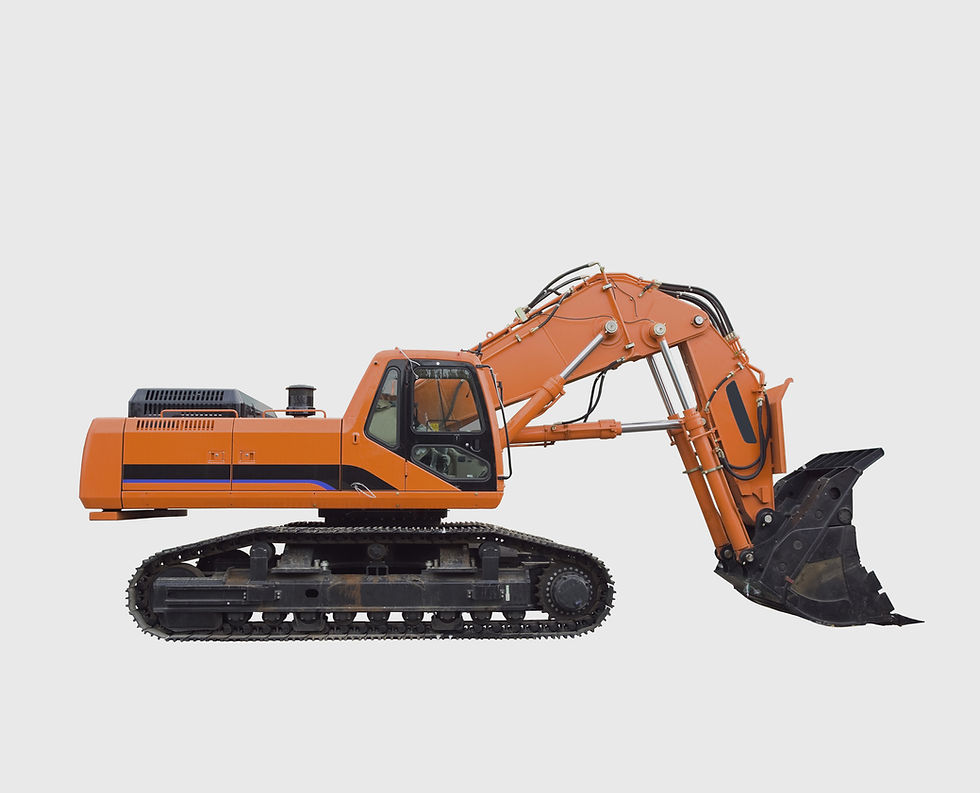Excavators: The Cornerstone of the Earthmoving Sector
- RALPH COPE

- Jun 9, 2024
- 4 min read

Excavators are often hailed as the backbone of the earthmoving industry. Their versatility, power, and efficiency make them indispensable across a wide range of construction, mining, and infrastructure projects. In this blog, we’ll delve into why excavators are the single most important machines in the earthmoving world, examining their key features, applications, and the value they bring to various industries.
Versatility and Multifunctionality
One of the primary reasons excavators hold such a crucial place in the earthmoving sector is their versatility. These machines are designed to handle a multitude of tasks, from digging and trenching to lifting and material handling. The ability to switch between different attachments, such as buckets, breakers, grapples, and augers, enhances their functionality. This versatility allows a single excavator to perform tasks that would otherwise require multiple machines, making them a cost-effective solution for many projects.
Digging and Trenching
At their core, excavators are digging machines. Their powerful hydraulic systems allow them to dig deep trenches and large holes with precision and efficiency. This capability is essential for various construction projects, including building foundations, laying pipelines, and creating drainage systems. The accuracy and speed with which excavators can perform these tasks significantly reduce labor costs and project timelines.
Lifting and Material Handling
Excavators are also equipped with lifting capabilities, making them suitable for handling heavy materials. Whether it’s lifting large pipes, moving debris, or placing heavy objects, excavators can manage substantial loads with ease. This functionality is particularly valuable in construction and demolition projects, where the ability to move heavy materials quickly and safely is paramount.
Breaking and Demolition
With the right attachments, excavators can be transformed into powerful demolition machines. Hydraulic breakers, for instance, can be used to break through concrete and rock, making excavators ideal for site preparation and demolition tasks. This adaptability ensures that excavators can be used throughout the lifecycle of a project, from initial site preparation to final cleanup.
Efficiency and Productivity
In the competitive world of construction and earthmoving, efficiency and productivity are key. Excavators are designed to maximize both. Their powerful engines and advanced hydraulic systems ensure that they can operate continuously under heavy loads without significant downtime. Modern excavators also come equipped with advanced technology, such as GPS and telematics, which enhance their efficiency and productivity.
Advanced Technology
The integration of technology into excavators has revolutionized the earthmoving industry. GPS systems enable precise digging and grading, reducing the margin of error and ensuring that projects are completed to exact specifications. Telematics systems provide real-time data on machine performance, fuel consumption, and maintenance needs, allowing operators to optimize their use and reduce operational costs.
Operator Comfort and Safety
Modern excavators are designed with operator comfort and safety in mind. Ergonomic controls, climate-controlled cabs, and advanced monitoring systems ensure that operators can work efficiently and safely, even in challenging conditions. The emphasis on operator well-being translates into higher productivity and reduced risk of accidents, further cementing the importance of excavators in the earthmoving sector.
Environmental Impact
As industries become more environmentally conscious, the role of excavators in promoting sustainable practices cannot be overlooked. Manufacturers are continuously innovating to produce more fuel-efficient and environmentally friendly excavators. Features such as hybrid engines, low-emission systems, and energy-efficient hydraulics are becoming standard, reducing the environmental footprint of these machines.
Sustainable Practices
The ability to perform multiple functions with a single machine also contributes to sustainability. By reducing the number of machines needed on a job site, excavators help lower fuel consumption and emissions. Additionally, the precision and efficiency of modern excavators minimize soil disturbance and reduce the environmental impact of earthmoving activities.
Applications Across Industries
The importance of excavators extends across various industries, each relying on these machines for critical tasks. Let’s explore some of the key sectors where excavators are indispensable.
Construction
In the construction industry, excavators are fundamental to almost every project. From residential buildings to large-scale infrastructure projects, these machines are used for site preparation, foundation digging, trenching, and material handling. Their versatility and efficiency make them a staple on construction sites around the world.
Mining
The mining industry heavily relies on excavators for tasks such as overburden removal, ore extraction, and material handling. The robust design and powerful performance of mining excavators allow them to operate in harsh conditions and handle large volumes of material, making them essential for mining operations.
Infrastructure Development
Infrastructure projects, such as road construction, bridges, and tunnels, require the capabilities of excavators for excavation, grading, and material transportation. The precision and power of excavators ensure that these projects are completed efficiently and to the required specifications.
Agriculture and Forestry
In agriculture and forestry, excavators are used for land clearing, irrigation projects, and tree removal. Their ability to operate in challenging terrains and handle diverse tasks makes them valuable assets in these industries.
Waste Management and Recycling
Excavators play a critical role in waste management and recycling operations. They are used for tasks such as material sorting, loading, and compacting, helping to streamline waste processing and recycling efforts.
Conclusion
Excavators are, without a doubt, the cornerstone of the earthmoving sector. Their versatility, efficiency, and adaptability make them the single most important machines in this industry. Whether it’s construction, mining, infrastructure development, agriculture, or waste management, the presence of an excavator is a common denominator in successful projects.
As technology continues to advance, excavators will become even more efficient and environmentally friendly, further solidifying their role in the earthmoving world. Their ability to perform a wide range of tasks with precision and efficiency ensures that they will remain indispensable to industries that rely on earthmoving machinery.
In summary, the significance of excavators in the earthmoving sector cannot be overstated. They are the workhorses that drive productivity, efficiency, and sustainability, making them the backbone of modern construction and industrial projects.








Comments